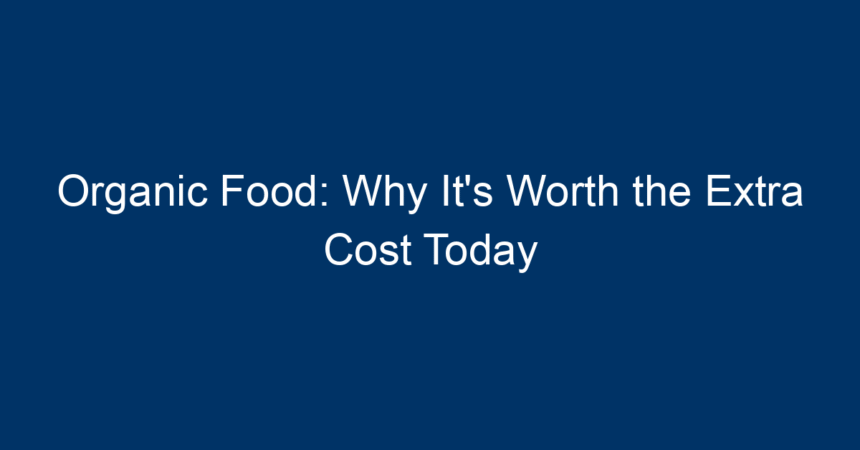In a world increasingly focused on health and sustainability, organic food has emerged as more than just a dietary choice; it’s become a lifestyle. If you’ve ever wandered through the grocery aisles and paused at the organic section, you might have noticed the prices are typically higher than conventional products. But what makes organic food worth the extra cost? This article dives deep into the myriad benefits of organic food, exploring its health advantages, environmental impact, and ethical considerations, ultimately making a compelling case for why investing in organic options is a wise choice.
What is Organic Food?
Before we delve into the reasons for choosing organic food, it’s essential to understand what organic means. Organic food is produced without the use of synthetic pesticides, fertilizers, genetically modified organisms (GMOs), and artificial preservatives. According to the USDA, organic farming practices prioritize ecological balance and biodiversity, resulting in food that is not only healthier but also more sustainable.
The Health Benefits of Organic Food
1. Fewer Chemicals in Your Diet
One of the most compelling reasons to opt for organic food is the significant reduction in exposure to harmful chemicals. Conventional farming often relies on pesticides and fertilizers that may leave harmful residues on food products. Studies have linked these chemicals to various health issues, including hormonal disruptions and increased cancer risk. By choosing organic, you reduce your exposure to these potentially harmful substances, leading to a healthier lifestyle.
2. Nutritional Superiority
While the debate over the nutritional differences between organic and conventional food continues, several studies indicate that organic food may offer higher levels of essential nutrients. Organic crops often have elevated antioxidants, vitamins, and minerals. These nutrients contribute to better health outcomes, such as improved immune function and reduced risk of chronic diseases.
3. Taste Matters
Many organic food enthusiasts swear by the superior taste of organic fruits, vegetables, and meats. This is largely due to the careful farming practices that prioritize the natural growth of food without the aid of synthetic fertilizers. Eating organic often means enjoying fresher, more flavorful produce, making your meals not just healthier but also more enjoyable.
Environmental Impact
1. Protecting Biodiversity
Organic farming practices emphasize crop rotation, plant diversity, and non-organic fertilizers. These methods contribute to the preservation of biodiversity in farming ecosystems. By supporting organic agriculture, consumers help protect a wide variety of plant and animal life that conventional farming often disrupts.
2. Soil Health and Sustainability
Healthy soil is the foundation of organic farming. Organic practices work to enhance soil health through composting, crop rotations, and reduced use of synthetic chemicals. Healthier soil leads to better water retention and reduced erosion, translating to a more sustainable farming model. By purchasing organic food, you’re not just supporting your health but also the health of the planet.
3. Lower Carbon Footprint
Organic farming has a lower carbon footprint compared to conventional methods. This is primarily because it often utilizes less energy-intensive techniques. Additionally, the avoidance of synthetic fertilizers reduces greenhouse gas emissions. By consuming organic food, you’re playing a part in combating climate change and promoting environmental sustainability.
Ethical Considerations
1. Animal Welfare
For many consumers, ethical considerations around animal welfare play a crucial role in choosing organic food. Organic livestock are raised in better conditions, allowing them access to outdoor spaces and a more natural diet. This is in stark contrast to industrial farming practices that often prioritize profit over ethical treatment. By choosing organic meat and dairy products, you contribute to more humane treatment of animals.
2. Supporting Local Farmers
Buying organic food often means supporting local farmers who practice sustainable agriculture. This not only helps to strengthen local economies but also encourages the use of environmentally friendly farming practices. By choosing organic, you help foster a food system that values community, health, and sustainability.
The Economics of Organic Food
While organic food carries a higher price tag, understanding the economics can help justify the cost.
1. Long-term Health Savings
Investing in organic food can lead to long-term health savings. By reducing the risk of chronic diseases associated with chemical exposure, you may save substantial amounts on healthcare costs over time. Healthier eating habits often lead to fewer medical interventions, contributing to overall financial savings.
2. Fair Trade Practices
Many organic food brands incorporate fair trade practices, ensuring that farmers are paid a fair wage. This ethical sourcing model contributes to social sustainability and economic fairness for producers, making the higher cost of organic food a part of a broader ethical choice.
Actionable Insights for Making the Switch to Organic
-
Start Slow: If you’re hesitant about the cost, consider starting with a few organic staples, such as dairy, eggs, or fresh produce varieties that typically have a higher pesticide residue in their conventional counterparts.
-
Utilize Local Resources: Explore local farmers’ markets or community-supported agriculture (CSA) programs to find organic produce at better prices. These options often provide fresher choices at competitive prices.
-
Grow Your Own: If you have the space, consider growing your own organic fruits and vegetables. Even small herb gardens can make a significant difference in your organic food intake.
-
Educate Yourself: Read labels and research brands committed to sustainable practices. Transparency in sourcing will guide your purchasing decisions.
- Plan Your Meals: Planning meals around what’s in season or on sale can help manage costs while focusing on organic options.
Conclusion: Invest in Your Health and the Planet
Ultimately, the choice to invest in organic food transcends mere dietary preferences; it embodies a commitment to health, sustainability, and ethical responsibility. While organic food may come with a higher cost, the myriad benefits it offers—ranging from better nutrition to positive environmental impact—make it a worthwhile investment.
As more consumers recognize the importance of health-conscious choices, the demand for organic food will continue to grow, potentially driving prices down in the long run. In making conscious choices today, you not only benefit your own health but also support a healthier planet for future generations. Start your organic journey today—your body and the environment will thank you!




